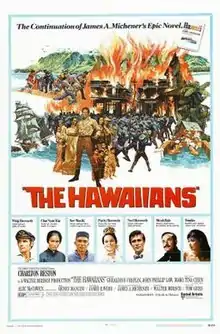The Hawaiians (film)
The Hawaiians, released in the UK as Master of the Islands, is a 1970 United States historical film based on the 1959 novel Hawaii by James A. Michener. It was directed by Tom Gries with a screenplay by James R. Webb. The cast included Charlton Heston as Whipple Hoxworth and Geraldine Chaplin. The performance by Tina Chen led to her receiving a Golden Globe nomination as best supporting actress.
| The Hawaiians | |
|---|---|
 | |
| Directed by | Tom Gries |
| Produced by | Walter Mirisch |
| Written by | James Michener (novel) James R. Webb |
| Starring | Charlton Heston Tina Chen Geraldine Chaplin Mako |
| Music by | Henry Mancini |
| Cinematography | Lucien Ballard Philip H. Lathrop |
| Edited by | Ralph E. Winters Byron W. Brandt |
Production company | The Mirisch Production Company |
| Distributed by | United Artists |
Release date | 17 June 1970 |
Running time | 134 minutes |
| Language | English |
| Box office | $2.3 million (US/ Canada rentals)[1] |
The film was based on the book's later chapters, which covered the arrival of the Chinese and Japanese and the growth of the plantations. The third chapter of the book had been made into the film Hawaii in 1966.
Plot
The story begins 40 years after the events depicted in the original Hawaii as a new generation of Americans and Asians must deal with a changing island and world. One of them is a sea captain.
Whipple "Whip" Hoxworth returns home to Hawaii to find his grandfather (Captain Rafer Hoxworth in the preceding film) has died and left his fortune to Hoxworth's cousin, Micah Hale. Whip, the black sheep of his otherwise very conservative and disapproving family, starts a plantation, staffing it with newly arrived Chinese indentured servants Mun Ki, and his second wife/concubine Nyuk Tsin.
Mun Ki fathers children with Nyuk Tsin, all the while dreaming of returning to China and his first and officially "real" wife. Nyuk Tsin has other ideas. For the remainder of the story she is referred to as "Wu Chow's Auntie". Wu Chow is their firstborn son, and the nickname serves to support the traditional fiction that Mun Ki's official spouse in China is the "real" mother of his children.
Whip steals valuable pineapples from French Guiana in the hope that they will grow in Hawaii. He gives the forlorn plants to Wu Chow's Auntie, knowing that she has a "green thumb". When she succeeds in nurturing the plants into flourishing, the overjoyed Whip offers to buy her some land as a reward. Over Mun Ki's opposition, she accepts. This is the first step in the rise of both Whip and Wu Chow's Auntie, as well as of the pineapple industry in Hawaii.
Meanwhile, Whip marries native Hawaiian, Purity, and has a son with her. However, because of her inbred royal Hawaiian ancestry, she is mentally fragile. Eventually, her mind gives way, and she can no longer abide to live with Whip. Their son Noel grows to manhood experiencing an uneasy relationship with his father.
When Mun Ki contracts leprosy, Wu Chow's Auntie accompanies him to the leper colony on Molokai. Upon Mun Ki's death years later, she returns to be reunited and reacquainted with her now-grown, educated, and prospering children.
A complication arises when Noel falls in love with Wu Chow's Auntie's only daughter. Neither parent approves of the marriage, but in the end, they grudgingly accept it.
Reception
The movie opened to mixed reviews, with many critics feeling it was not as successful as the earlier movie Hawaii (1966), which was liked by both moviegoers and critics. It made less money than the original.
Writing for The New York Times, Roger Greenspun called it a "movie with reasonable claims to having something for almost everybody", with "spectacle" that proceeds with "efficient and attractive modesty"; he complimented the director's craftsmanship and highlighted the performances of John Phillip Law and Charlton Heston, but said "Geraldine Chaplin offers only a disturbing evocation of her father's face, without the other qualities of his presence."[2] He calls Tina Chen "not remarkable", even though she has a "role almost equal to Heston's".[2]
Time magazine was even less complimentary, saying "the plot is laced with the usual colonial tensions and pretensions: Hoxworth feuds with a polyglut of races while his pineapple princess (Geraldine Chaplin) goes quietly mad. Every time the pace slackens, which is often, someone goes to sea, either to pick up field hands or to transport lepers to Molokai. The incessant ebb and flow is intended as a metaphor for the turbulent tides of Hawaiian life. But the real metaphor here is the pineapple, which in the good old gangster days was a synonym for bomb.[3]
Tina Chen received a Golden Globe nomination for Best Supporting Actress. Bill Thomas was nominated for an Academy Award for Best Costume Design.
Home media
The Hawaiians was released on a home video format (DVD) on January 28, 2011 as part of the MGM Limited Edition Collection series.
See also
References
- "Big Rental Films of 1970", Variety, 6 January 1971 p 11
- Roger Greenspun (June 18, 1970). "The Hawaiians, with Something for Everybody, Arrives". The New York Times. Retrieved 2010-05-20.
- "Cinema: Pineapple Pap". Time. June 29, 1970. Retrieved 2010-05-20.
External links
- The Hawaiians at IMDb
- The Hawaiians at the TCM Movie Database
- The Hawaiians at AllMovie
- The Hawaiians, video on demand from Hulu